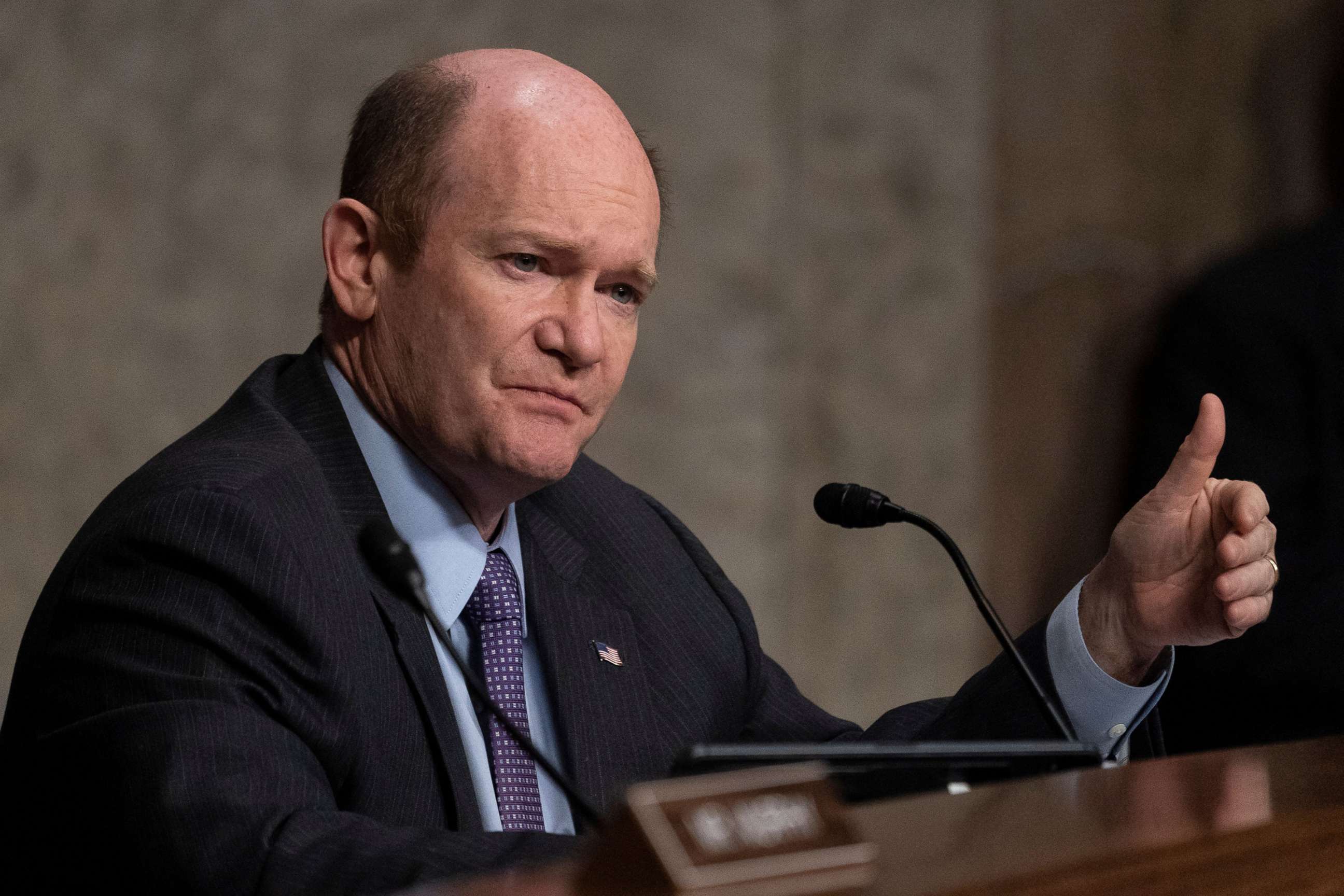Sen. Chris Coons says he's 'gravely concerned' Russia will invade Ukraine but defends administration's response
He said he hopes Biden's "work to strengthen deterrence" will succeed.
Sen. Chris Coons, D-Del., on Sunday defended the Biden administration's response to the standoff between Russia and Ukraine but said he's "gravely concerned" that President Vladimir Putin will order Russian troops to invade its neighbor.

"The most important thing President Biden has been doing is to deter Putin from invading Ukraine. He has pulled together our NATO allies," Coons said on ABC's "This Week." "I think our work in the Senate, and Biden's work to strengthen deterrence is hopefully what is going to succeed. But I am gravely concerned that Putin will show aggression again in Europe and cross the boundary into Ukraine in the coming days or weeks."
Secretary of State Antony Blinken met with Russian Foreign Minister Sergei Lavrov in Geneva last week as U.S.-Russia tensions continue to rise over the standoff with Ukraine. While diplomatic talks continue, Biden did concede Wednesday that he believes Russian President Vladimir Putin will advance troops into Ukraine but says Putin "does not want any full-blown war."
Blinken has warned of "massive consequences" if Putin invades Ukraine, but the administration has so far continued to engage in diplomatic talks with its NATO allies and the Russian government.
"This Week" co-anchor Martha Raddatz pressed Coons, who sits on the Foreign Relations Committee, about his support for a bill that would impose "crippling sanctions" on Russia, but only if Putin chooses to invade Ukraine.
"Why not impose sanctions now?" she asked.
Coons, a close ally of President Joe Biden, said passing a bipartisan bill would "show resolve and determination," but only "some sanctions" should come now.
"The very strongest sanctions, the sort of sanctions we used to bring Iran to the table, is something we should hold out as a deterrent to prevent Putin from taking the last step of invading Ukraine," he said.
Asked about reports that British intelligence believes Russia plans to install a pro-Moscow government in Ukraine, Coons said it's important that the United States and its allies continue to "call out" Russia's plans.
"One of the things that we are doing to show resolve and bipartisan determination is engagement with Zelensky to support him," Coons said, noting members of Congress have engaged virtually and in person with the Ukrainian president.
"I think it's important... that the United Kingdom and the United States that our intelligence communities call out in advance things that we are learning Russia is planning to make it clear to the rest of Europe just how aggressive and just how creative Putin intends to be in both overt and covert means in trying to overthrow Ukraine’s government, its independence and to violate its sovereignty," he added.
After a failed vote in Congress last week to pass voting rights legislation amid a wave of restrictive voting laws being passed throughout the country, Raddatz also asked Coons about the fate of voting rights.
Coons emphasized the importance of Congress passing national legislation and defended Democrats' recent efforts to pass a bill, saying, "We're going to keep trying, keep working at it."
"This was an important fight to show that sharp contrast between Democrats and Republicans this last week on the floor of the Senate," he said.
The voting rights legislation was supported by all 50 Democrats in the Senate but ultimately failed to pass as Sens. Joe Manchin, D-W.Va., and Kyrsten Sinema, D-Ariz., opposed removing the filibuster to pave a path for passage with a simple majority.
Expanding voting access and making it overall easier to participate in elections has become a central issue for Democrats, who've accused Republican lawmakers are trying to suppress votes.
Raddatz pressed Coons on this, asking, "But ... have you really seen evidence of suppression?"
"Absolutely," the senator responded. "We've seen abundant evidence that there are laws being passed that roll back things like ballot drop boxes, drive-through voting, 24-hour early voting, restricting access to the ballot box who particularly in an ongoing pandemic are medically vulnerable."
"We made significant progress to make it easier to vote in the pandemic in 2020. Why would we be rolling that back in a dozen states when the pandemic isn't over? Why would we be erecting new barriers for people to be able to vote? We've seen cleverly crafted laws that will do things like automatically remove people from the voting rolls or make it harder for them to apply for mail-in ballots that I believe are designed to suppress the vote," he added.
Since the 2020 election, 19 states have enacted over 30 laws making it more difficult to vote according to the Brennan Center for Justice. President Joe Biden expressed "disappointment" after the legislation failed on Wednesday and said he will use "every tool at our disposal to stand up for democracy."
But Raddatz pressed Coons on a comment Biden made during his hourslong press conference last week when he discussed efforts to "alter the outcome" of the next election.
"Democrats have been united against former President Trump's efforts to cast doubt on the last election. But in his press conference, President Biden cast some doubt of his own about the next one," she said, noting that the president later tried to walk back the comment.
"Well, Martha, what you're hearing there is President Biden's passionate commitment to making sure that we are pushing back on voter suppression and that we secure access to the ballot for as many Americans as is possible. That's something I’m also passionately committed to and we need to make it clear to the American people what's at stake here and why we're fighting so hard to secure the right to vote," Coons said.




